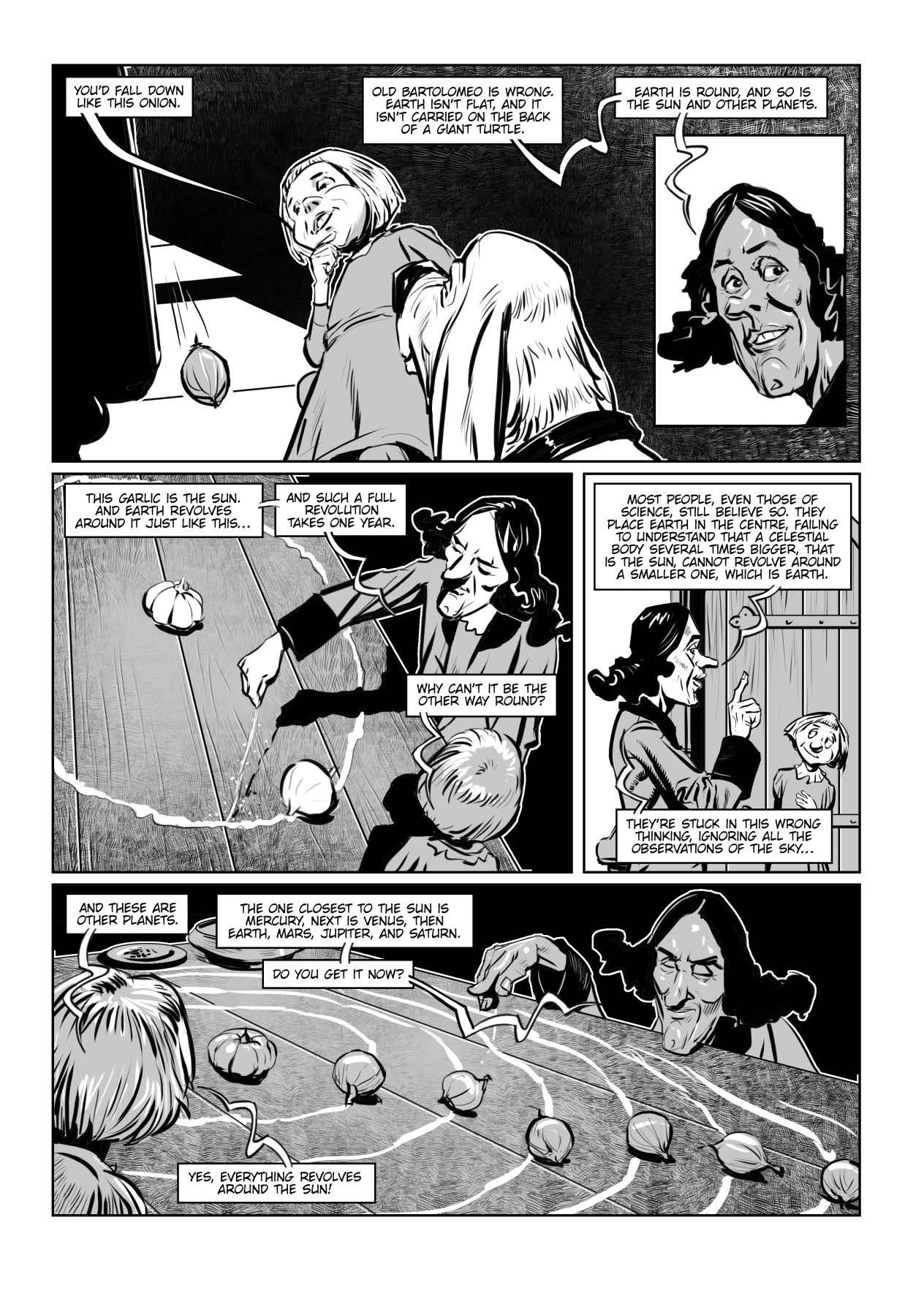 Maciej Jasiński Jacek Michalski
Maciej Jasiński Jacek Michalski
There may not be another equally important person in our culture whose work impacted the world to such an extent. We now know a lot about the significance of Nicolaus Copernicus, his place in the "pantheon of great men," and his role in the world of science. We often repeat a funny, almost iconic, movie statement: Copernicus was a woman. In a word, the presence of Copernicus in the mass culture is evident. And we can surely find many "Copernican traces." Everyday objects with images of Copernicus have become very popular recently, and there are many of them on our domestic market, especially in connection with the 500th anniversary of the Astronomer’s birth celebrated in 1973.




Speaking of pop-culture, we can’t overlook such a literary form as comic. Unfortunately, there are only few comic books dedicated to Nicolaus of Toruń. Indeed, Tytus Romek i A’Tomek. Księga VIII by Papcio Chmiel (Henryk Jerzy Chmielewski), the comic book master, is connected with the 500th anniversary, but the character of Copernicus is just a background to the adventures of three friends: Tytus, Romek and A’Tomek, who engage in the scouting action under the name Operation 1001-Frombork. For the record, the astronomer's character also appears in comic books by other writers, such as Eryk Lipiński, Mieczysław Kościelniak, or Bohdan Butenko (Kwapiszon’s adventures). The number of works, however, is far from impressive. That is why it is necessary to give recognition to authors Jacek Michalski and Maciej Jasiński, thanks to whom we can encounter the story of the life of Nicolaus Copernicus in a full-blooded comic book with the Astronomer as the main character. Let’s explore some facts about Copernicus’s life that have shaped the plot.
He was born on February 19, 1473, in Toruń. He was one of four children of a merchant from Cracow, Nicolaus Copernicus, and his wife Barbara, nee Watzenrode, the daughter of a wealthy Toruń merchant. Historians are still wondering whether he was the youngest child or perhaps his brother Andrew was. In 1483, when Nicolaus was 10 years old, his father passed away. The boys were taken care of by their mother’s brother Lucas Watzenrode, later appointed Bishop of Warmia. He sent Nicolaus and Andrew to Cracow, where they started their studies at the University of Cracow. The astronomer attended the lectures by John of Głogów and may have had become familiar with Albert of Brudzewo, which strengthened his passion for astronomy. From 1496, he continued his studies in Bologna, Italy, where he studied canon law, and then in Padua, where he pursued medical studies. Meanwhile, in the jubilee year 1500, he completed his legal apprenticeship at the Papal Curia in Rome. In 1503, he received a doctorate in canon law in Ferrara, and thanks to his studies in Padua, he got a licence to practice medicine. In the same year, he left Italy and spent the rest of his life in Warmia, where Lucas Watzenrode had been the Bishop since 1489. He was appointed his uncle’s secretary, and thus, from 1504 to 1509 he resided in the castle in Lidzbark Warmiński. With his uncle’s protection, he was admitted to the Warmian Chapter while he was still a student in Bologna, in 1497. He was the chapter’s chancellor, economic administrator and visitor of chapter’s estates, he was in charge of food supplies and construction fund, he supervised the weaponry of the stronghold in Frombork, and he also oversaw the execution of last wills and testaments. This short list of duties and functions shows that he was not a scientist committed to research only.
During his stay in Warmia he was interested in monetary and economic affairs. At the assembly of the Royal Prussia states in Grudziądz, in 1522, he presented his postulates regarding the monetary system of Prussia. He advocated strong unified currency. His ideas were later written down in the Treatise on Money, which included the economic law, still valid today, stating that bad money drives out good. Despite numerous duties and activities, he never gave up his astronomical interests and continued his observations of the sky. However, it wasn’t until just before his death that he’d decided to publish his revolutionary work De Revolotionibus, the title of which was changed by the Petreius printing house in Nuremberg in 1543 to De Revolutionibus Orbium Coelestium. (On the Revolutions of the Heavenly Spheres). Nicolaus Copernicus died in May of the same year.
M ICHAŁ KŁOSIŃSKI Curator of the Nicolaus Copernicus’ House, Toruń Regional Museum















































writer
Maciej Jasiński
artist
Jacek Michalski
cover artist
Krzysztof Trystuła
consultation
Michał Kłosiński
translation
Agnieszka Szewczuk
ISBN 978-83-965996-4-3
year of publication 2022
print run 1000 copies
published by
Agencja Reklamowa GALL sc
ul. Szosa Chełmińska 50, 87-100 Toruń
gall@gall.torun.pl
commissioned by The Kujawsko-Pomorskie Region
Contact:
Office of the Marshal of the Kujawsko-Pomorskie Region in Toruń
Address: Plac Teatralny 2, 87-100 Toruń, tel. +48 56: 6218600, 6218610
Kontakt:
Urząd Marszałkowski Województwa Kujawsko-Pomorskiego w Toruniu Plac Teatralny 2, 87-100 Toruń, tel. 56 62-18-600, 56 62-18-610
e-mail: punkt.informacyjny@kujawsko-pomorskie.pl www.kujawsko-pomorskie.pl
e-mail: punkt.informacyjny@kujawsko-pomorskie.pl www.kujawsko-pomorskie.pl
facebook.com/WojewodztwoKujawskoPomorskie
twitter.com/lubietubyc
instagram.com/kujawskopomorskie
youtube.com/user/umwkp
issuu.com/kujawsko-pomorskie

flickr.com/photos/kujawskopomorskie
Check out other comic book stories about great figures of Kuyavia and Pomerania
Situated on the border of Kuyavia and Pomerania, Toruń is the city where 550 years ago a remarkable scientist was born – Nicolaus Copernicus. If you have a chance to visit this place – during a school trip or with family, or perhaps that’s where you live – make sure that when you walk around the Old Square, along Żeglarska Street or Kopernika Street, you imagine that young Nicolaus, the future Great Astronomer, walked exactly the same streets. When he was your age, he went to school at St. Johns’ Cathedral every day, probably playing around with his friends on his way there. At that time, the street where his family house is located today was called St. Ann’s Street. It was named after Copernicus many years later in recognition of Nicolaus’s achievements.
This outstanding scientist, who discovered that the Sun is the centre of our Solar System (not Earth, as had been believed for thousands of years) and all the planets revolve around it, was once a typical teenager. He liked to play and make jokes. But he also loved dreaming, especially that one day he would understand the laws governing the Universe.
Here is the story of the life of one of those great men who alone changed the course of history. Without the discoveries of Copernicus, born in Toruń (today one of the two capitals of the Kujawsko-Pomorskie Region), neither contemporary science nor spaceflights would exist. Just like little Nicolaus, don’t be afraid to follow your dreams. Who knows, perhaps thanks to this, one of you will change the future of our planet, too.
ISBN 978-83-965996-4-3
 PIOTR CAŁBECKI Marshal of the Kujawsko-Pomorskie Region
PIOTR CAŁBECKI Marshal of the Kujawsko-Pomorskie Region
